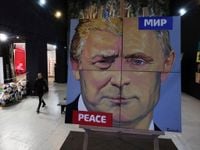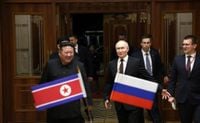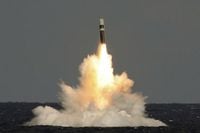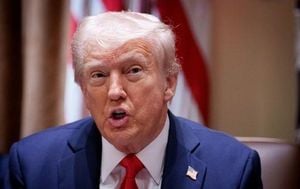In a significant shift of U.S. foreign policy, President Donald Trump has ignited concerns regarding the geopolitical landscape through engagements with Russia, sidelining Ukraine in negotiations to end the ongoing war. Such a move raises alarms, especially considering North Korea’s unchecked involvement in supplying arms and manpower to Russia’s invasion forces.
For over a year, North Korea has been fueling Russian President Vladimir Putin’s assault on Ukraine, marking a blatant infringement of U.N. Security Council resolutions. Ignoring this violation undermines international norms against the proliferation of weapons of mass destruction, further emboldening Kim Jong Un’s nuclear ambitions on the Korean Peninsula.
As the United Nations sanctions against North Korea continue to deteriorate, the potential for Moscow to recommit to these sanctions appears bleak. Historical precedents highlight a decline in U.N. sanctions effectiveness, especially after Russia and China vetoed a resolution to impose additional sanctions on North Korea in May 2022. This pattern culminated recently when, in March 2024, Russia vetoed a resolution extending the mandate of the Panel of Experts—a vital entity monitoring sanctions and reporting violations.
Russian Ambassador to the U.N., Vasily Nebenzia, criticized the sanctions as “open-ended” and “largely detached from reality,” reflecting a departure from effective oversight of North Korea’s actions. Meanwhile, a coalition of Western countries including the U.S., France, Japan, South Korea, and the U.K. condemned Russia’s attempts to diminish independent investigations regarding North Korea’s sanctions violations, emphasizing the growing threat posed by North Korea, exacerbated by Russian support.
Recent reports from the Open Source Centre, a London-based nonprofit, have revealed that a sanctioned Russian vessel has made multiple trips transporting arms from North Korea to Russia—a revelation that substantiates suspicions of a burgeoning military cooperation between the two nations that exploits rifts in the U.N. sanctions regime.
The complexity of this geopolitical situation is further illustrated by the interplay between Trump and Putin as they navigate issues related to North Korea. Both leaders presently lack significant motivation to rekindle discussions about North Korea, with Trump’s past negotiations leading to substantial failures, notably the 2019 Hanoi summit that left both parties at an impasse over denuclearization terms.
Currently, Trump’s U.S. administration finds itself in a precarious position, with the president having relinquished much of his previous negotiating leverage. His recent remarks labeling Ukrainian President Volodymyr Zelenskyy as a “dictator” and claims regarding Ukraine initiating the war have driven a wedge between American alliances, raising questions about the future of U.S. intervention in ongoing conflicts.
Experts suggest that it is imperative for Washington to maintain pressure regarding North Korea, stressing that ignoring Russia’s violations could further embolden North Korea’s nuclear developments. As tensions escalate, Pyongyang has reiterated threats toward the U.S. contingent upon military activities by Washington and Seoul.
One potential strategy to improve U.S. leverage would be to separate North Korea from its strategic partnership with Russia. A proposed ceasefire agreement should ideally mandate the withdrawal of North Korean troops from Ukraine, pressuring Russia to adhere to its U.N. sanctions commitments, alongside a renewed establishment of the U.N. Panel of Experts.
These measures could pave the way for a more solidified U.S. stance and perhaps reset negotiation dynamics with North Korea, thus facilitating a broader discussion on denuclearization and regional stability.
In parallel to this unfolding situation in Ukraine, Europe is grappling with existential threats due to both Russian aggression and concerns over American commitment to transatlantic security. As a reaction, discussions around the establishment of an independent European nuclear deterrent are gaining momentum.
Historically, countries such as France and the U.K. have maintained their nuclear arsenals under the protection of the U.S. nuclear umbrella. However, a shifting political landscape has prompted leaders like Polish Prime Minister Donald Tusk to advocate for Poland considering its nuclear capabilities in light of Russian threats. The needs are acute, as a significant majority of Ukrainians express a desire for reinstating their nuclear capabilities lost post-Soviet Union.
Amidst this backdrop, there are discussions around a serious proposal for a collective European nuclear strategy, potentially aligning with France and the U.K. to enhance continental security. Such developments signal a critical shift in defense posture for the region, as European nations feel the pressure to respond more robustly to perceived abandonment by the U.S.
While the notion of a European nuclear program is contentious, the implications extend far beyond mere military enhancements. Experts have suggested that pursuing independent nuclear capabilities would elevate Europe’s global standing and allow for a more balanced diplomatic approach toward powers such as the U.S. and China.
As tensions rise, historical narratives are invoked, with references made to former Soviet strategies that sought legitimization of power through territorial control. 368529 2638935890 Russia's identity as a great power and its role in shaping geopolitical dynamics have been underscored by historians like Sergey Radchenko, who elaborates on the Kremlin’s ambitions throughout various chapters of its history. The present-day push for recognition as a great power remains central to Putin's foreign policy objectives.
On March 20, 2025, President Putin issued a decree threatening the eviction of Ukrainians from their homes in the occupied territories if they refuse to accept Russian citizenship—an action that has been denounced by Ukraine as part of a broader strategy of genocide aimed at eradicating Ukrainian identity.
With strict compliance deadlines set within the decree, Russian policy indicates an aggressive Russification campaign targeting the population within illegally annexed territories. As the situation evolves, implications surround the preservation of Ukrainian culture and international response to such actions.
As both North Korea and Russia seize opportunities to advance their respective agendas, the stakes remain exceedingly high. Navigating a complex geopolitical landscape calls for renewed focus on international cooperation and adherence to established norms that govern global security. Only by rallying behind clear diplomatic frameworks can key players shift dynamics towards stability in both Eurasia and the Asia-Pacific region.







